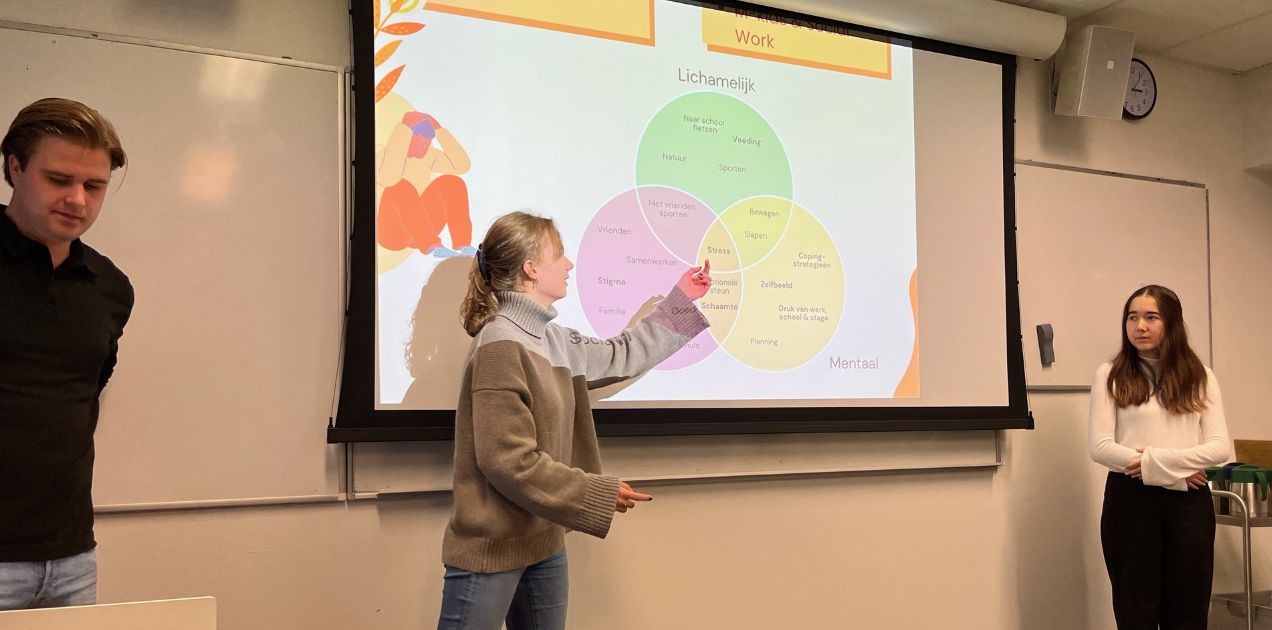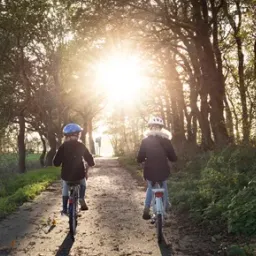
At Leiden University, in academic year 2024-2025, the minor “Co-creating a healthy society” was given for the first time to third-year bachelor students, set up by Leiden-Delft-Erasmus (LDE) universities in cooperation with the universities of applied sciences of Leiden, The Hague and Rotterdam, Learning with the city and Medical Delta.
The motive
"No single discipline can solve the major challenges to health and well-being on its own," argues Sandra van Dijk, associate professor of health psychology at Leiden University and coordinator of the LDE minor. In today's society, “wicked problems”, or problems that transcend disciplines, are increasingly at play. To solve these problems, professionals from different disciplines need to cooperate with societal stakeholders. This is known as transdisciplinary cooperation.
The LDE minor “Co-creating a healthy society” was set up by initiators LDE Medical Delta and Learning with the City. Coen Wirtz works at Learning with the City and is also associate professor of social, economic and organisational psychology at Leiden University. He explains that Learning with the City is a partnership between Leiden University, Hogeschool Leiden, mboRijnland and the municipality of Leiden. The aim of this cooperation is twofold . By having students from different educational institutions participate, interdisciplinary cooperation is promoted. In addition, by collaborating with residents and organisations, students can contribute to local issues. Through these collaborations, students learn on a personal and social level in addition to the content.
The Healthy society programme of LDE and Medical Delta is a thriving programme that, in cooperation with the province of Zuid-Holland, tackles major interdisciplinary issues. This is done with partners from various disciplines, including Social Sciences, Public Administration, Architecture, Law, Medicine. The methodology of the minor is based on challenge-based learning and participatory action research. Students went out into the neighbourhood, connecting with stakeholders in day-to-day life, allowing them to do their bit to solve real problems.
Coen Wirtz
It is a reciprocal relationship. Students develop their skills in a rich learning environment, through contact with parties outside their bubble. In this process, they simultaneously find solutions to problems that are real in society."
Procedure
To encourage interdisciplinary cooperation, students from all disciplines and education levels were allowed to apply for the minor. In the end, ten students participated. They worked together in teams and were therefore in constant contact with perspectives from other disciplines. The minor lasted 20 weeks and was split into two parts: A and B. The aim of this structure was to first teach students in part A to analyse and define a problem based on knowledge from different disciplines and practice, so that in part B they could then apply their knowledge through co-creation to work on transdisciplinary solutions to three “wicked problems”. These problems were put forward by the client, in this case the municipality of Leiden. Students investigated mental health among migrants of different generations, stress among mbo students, and financial stress among students.
In part A, students first followed content courses from various disciplines. These were Psychology (Leiden University), Public Administration and Social-Medical Sciences (Erasmus University Rotterdam) and Architecture (Delft University of Technology). This gave them lessons on stress models and models of governance. Students were able to use this knowledge to analyse “wicked problems”. Besides the substantive subjects, there was also a lot of focus on self-reflection. In subjects such as Participatory Action Research and Interdisciplinary Reflection and Coaching, much time was spent on field experiences, and interdisciplinary thinking and collaboration.
At the end of Block A, students gave a presentation on the problems they had identified. A group of five students then moved on to Part B, which focused on stress among mbo students and how to reduce it. In part B, the students worked on developing a solution to their problem. This was done through co-creation, which meant that the group worked together with mbo students to find out what could help them experience less stress. This included using Serious Lego, a method where concepts are explained and clarified by building with LEGO. A concrete solution emerged from these co-creation sessions that fitted well with the needs and wishes of MBO students: a series of interactive workshops for MBO students on different forms of stress, how to recognise them and how to deal with them.
Results
The track concluded with a presentation in which the students presented their findings and solutions, including by giving part of a workshop. This presentation was also attended by stakeholders, those involved from the mbo, municipality and part of an mbo class. The results were received very positively. The students' recommendations will be further developed by the municipality and by the Knowledge Centre for Anxiety & Stress in Youth, which itself was already working on a similar project.
The participating students praise the minor. They say they find it extremely valuable to work in teams on real social issues, especially in collaboration with students from other disciplines and social partners. They feel that in this way they make a concrete contribution to society, something that is usually not the case with regular bachelor courses. Through moments of reflection and the experience of interdisciplinary cooperation, students will feel better prepared for the job market after graduation.
The accompanying lecturers are also extremely enthusiastic and therefore have the ambition to offer this minor again next academic year. However, they do take some points for improvement from this pilot. For instance, it would be valuable to be able to offer this form of education to a larger group of students. In addition, the “wicked problems” could be formulated less broadly, so that students spend less time specifying the given problem.
One of the overarching goals of this minor was to promote and teach transdisciplinary collaboration. Students came from the disciplines of Pedagogy, Public Administration, Architecture, Psychology, Biology and Urban Studies. Thus, many different perspectives were represented. This demanded extra skills from both the students and the supervising teachers. Coen stresses that this should not be underestimated: ‘Just putting people from different disciplines together does not yet mean interdisciplinary collaboration.’ ‘You have to be able to empathise with each other and get to know each other's language, because it differs per discipline,’ Sandra adds.
All in all, the pilot of the LDE minor has been a great success. Sandra and Coen indicate that it was great to see the successful final presentation and to be able to facilitate interdisciplinary learning. It is also great to see the students' results being further developed by partners. ‘More teaching and research should be set up this way!’ says Sandra. says Sandra.
Sandra van Dijk
More teaching and research should be set up this way!'


